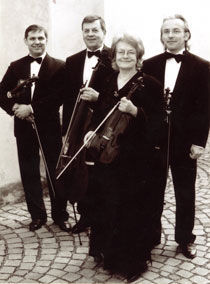|
Symphony
MYSTICAL PLANETS AND LIVELY GERSHWIN ORTIZ AT FINAL SRS CONCERT
by Peter Lert
Sunday, May 4, 2025
Symphony
VSO'S CONCERT MUSIC OF TIME, MUSIC OF PLACE
by Peter Lert
Sunday, April 27, 2025
Choral and Vocal
VOCAL ELEGANCE AND FIRE AT THE 222'S RECITAL APRIL 26
by Pamela Hicks Gailey
Saturday, April 26, 2025
CANTIAMO SONOMA SINGS AN INSPIRED GOOD FRIDAY MOZART REQUIEM CONCERT
by Pamela Hicks Gailey
Friday, April 18, 2025
DRAMATIC SHOSTAKOVICH SYMPHONY CLOSES PHILHARMONIC'S 25TH SEASON
by Terry McNeill
Sunday, April 13, 2025
LARGE COLLEGE OF MARIN AUDIENCE GREETS STOPHER ARTISTRY
by Terry McNeill
Saturday, April 5, 2025
Chamber
FRISSON DELIVERS SHIVERS OF DELIGHT
by Abby Wasserman
Sunday, March 30, 2025
OLD AND MOSTLY NEW IN SRS MARCH CONCERT IN WEILL
by Peter Lert
Saturday, March 22, 2025
Symphony
TWO FORMIDABLE SYMPHONIES AND PURPLE MOUNTAINS AT SRS CONCERT
by Peter Lert
Sunday, February 23, 2025
Chamber
THE PARKER CAPTURES DEMANDING ADES QUARTET AT RAC SEBASTOPOL CONCERT
by Peter Lert
Saturday, February 15, 2025
|
 |
 Vilnius String Quartet |
THE LITHUANIANS HAVE LANDED
by Steve Osborn
Saturday, January 19, 2008
Between Beethoven and Brahms lurks--Onute Narbutaite. At least that's the version of music history proposed by the Vilnius String Quartet at their sold-out concert in the Occidental Community Church on Jan. 19. One hears Beethoven and Brahms all the time, but Narbutaite--a contemporary female Lithuanian composer--is a rarity in American concert halls. If the performance by her fellow Lithuanians is any indication, she deserves more frequent hearing.
Born in 1956, Narbutaite began composing as a teenager. She attended the Lithuanian State Conservatory and has made her living as a freelance composer in Vilnius, the Lithuanian capital, since 1982. "Open the Gates of Oblivion," performed to near-perfection by the Vilnius Quartet, comes from early in her career, when she was identified with a group of "neo-romantic" composers in Lithuania and elsewhere. Forsaking both serialism and minimalism, "Open the Gates of Oblivion" focuses on tone, atmosphere, and contemplation.
The one-movement, 15-minute work begins with a plucking cello, followed by high notes from the first violin, glissandos from the second, and a drone note from the viola. Having established distinct roles for each instrument, the work evolves slowly, driven by subtle changes in the viola drone. Each modulation reveals a new sonic figure, more like a painting or sculpture than a musical narrative. Within each figure, the music goes around and around, its motion primarily circular rather than linear.
And what music it was! The Vilnius played Narbutaite's score with passion, understanding, and finesse. From the cello's resonant opening notes, to the viola's steady beat, to the piercing tones and eerie slides from the violins, every aspect of the performance was well controlled and detailed. The only flaw was outside the musicians' control: one of the violist's strings broke during a particularly intense section near the end of the piece, and he had to rush from the stage in search of another. Upon his return, the quartet plunged right back in where they had left off, instantly regaining their musical intensity.
In a world of sound-alike quartets, it's a rare treat to hear contemporary works played by musicians who actually know the composer and can work with him or her to refine the performance. For the other two works on the program, however, the Vilnius reverted to the more typical mode of interpreting the composers of the past, none of whom can speak from the grave. They succeeded brilliantly with Beethoven, but their Brahms left something to be desired.
Beethoven's third quartet, which opened the evening, is an utter delight, and the Vilnius clearly enjoyed performing it. One imagines they have done so many times before. Founded in 1965, the quartet still retains its original first violinist, Audrone Vainiunaite, daughter of a Lithuanian composer. The other members, all men, are more recent arrivals, but they played as if they had all been together since Day One.
The opening movement of the Beethoven was luxuriant and unhurried, with rhythmic flexibility. Vainunaite's piercing tone was well suited to her virtuosic part, and the other instruments provided both solidity and depth. The inner voices were particularly distinctive in the lush second movement, which provides each instrument with a share of the limelight. The real fireworks, however, came in the last movement, with its strong accents and blistering pace. Despite a few intonation problems from Vainunaite, the effect was mesmerizing. There was real excitement in the dynamic contrasts, and the rollicking tempo made one want to dance. At the conclusion, several audience members stood to applaud, a custom usually reserved for the concluding work of the night.
After the Narbutaite and a lengthy intermission, the Vilnius returned to the stage to perform Brahms' second quartet, in A minor. For whatever reason, their previous intensity was lacking, and their performance was somewhat muddled. Unlike Beethoven, Brahms is not particularly well known for his string quartets, of which he published only three after destroying many failed efforts. One of the reasons for Brahms's own misgivings about his quartets may be related to his blending of the instruments, which is more orchestral than chamber. Unlike Beethoven, he fails to give each instrument a distinctive voice, and the textures tend to get murky.
The challenge in performing Brahms's string quartets is to pull the themes out of the dense thicket of sound. Although the Vilnius made a valiant effort, Vainunaite's tone and vibrato weren't quite up to the task. The notes were all there, but the certitude and clarity were lacking. Nonetheless, the audience responded with warm applause.
The concert concluded with a sparkling encore, a tarantella by the 20th-century Czech composer Erwin Schulhoff, whose music is finally coming into its own after years of obscurity. Leaving the gravitas of Brahms far behind, the Vilnius performed the tarantella, a swirling southern Italian dance, with vigor and grace. Their final standing ovation was well deserved.
|
